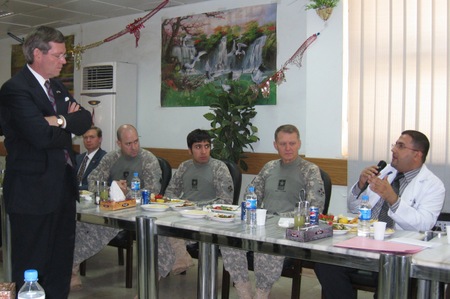Iraq Blog IV
Iraqi Health Outside The Green Zone
I wanted to see health-care facilities, patient care, and to talk with doctors and health-care workers outside the Green Zone. It was suggested I visit Medical City in central Baghdad.
Medical City is the largest medical complex in Iraq, and includes six hospitals and the Baghdad University College of Medicine. It has almost 3,000 beds, and is the leading provider of tertiary services for the entire country.
During the 1990s, the complex’s infrastructure aged, and the hospitals have suffered rapid degradation. As Prime Minister al-Maliki told me, “Medical City has exceeded its expiration date.”
The tap water in many of the hospitals is not safe to drink, equipment is not sterilized and doctors cannot find water or disinfectant to wash their hands. The availability of medicines and medical supplies is a major problem.
Getting there was rather instructive on the challenges that remain. While I acknowledge my profile as a target likely warranted some special precautions, there are obvious risks anytime an American ventures outside the Green Zone, and serious security operations have to accompany any such move. The people executing the moves are well-trained and operationally proficient.
For security reasons, I won’t go into details, but, suffice it to say, the move involved a coordination of multiple operating units on the ground, and in the air. We wore heavy protective gear on our persons, and moved fast, minimizing any opportunity for a negative incident. I feel appreciative toward those who planned and executed my travel around Iraq so safely and efficiently.
Once at Medical City, it became clear health care in Iraq is different from that in many countries. Iraqi health-care facilities rely less on nurses and technicians. It is not uncommon for families to take up residence in the hospital to care for family members. In fact, I was shown facilities set aside to house some of them. I was told in some facilities they will even cook in the hallways, but I didn’t see that during my visit.
While I did tour a pediatric unit, where I mostly saw premature babies, most of whom had been born in other regions of Iraq, I was not able to tour many of the patient areas because of security concerns.
Much of my time was spent talking with students, faculty and staff. I began to experience what the Prime Minister had referenced in our conversation about what happens when freedom is given to people who have been oppressed for a time. There is a profound impatience for improvement.
Students would talk about the inadequacy of their training. Using the Internet, they know what is available in the rest of the world, but they see little of it.
In a meeting I held with students who were bused in from Baghdad University, I ended up playing referee for a fascinating exchange between a student and the Dean of the university’s medical school.
The student, in his final year of his six-year course, had made the point he and his peers were not being exposed to new imaging technology. The Dean stood up to say the medical school did have some new imaging equipment, and that the students’ training included exposure to it.
The student responded, “With all due respect, sir, we don’t have access to it. I just finished my radiology section, and we only got to see the CAT scanner through the glass of a locked door. Nobody knows how to use it.”
That exchange was symbolic of what I heard over and over again.
At the conclusion of my meetings with a fairly large sample of Iraqi medical people, I came away resolved that in the short time I have left at HHS, I would find a way to facilitate more direct contact between practitioners in Iraq and American doctors. Even if it is just e-mail, calls over cell phones and an occasional video conference, both sides of the equation will benefit, and our relationship with the people of Iraq will grow.
We have a strong and complex relationship with the Government of Iraq. Our relations now need more contact between our people.


Thank you Secretary Leavitt! America is grateful for your exemplary service. You are a true patriot and American hero! Thank you for improving and protecting the health of our citizens. It is a tragic loss that we will no longer have you in office. May the Lord bless you for your outstanding service to our nation.
God Speed!
Posted by: John S. Jarstad, M.D. | November 21, 2008 at 04:53 AM